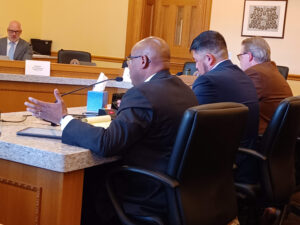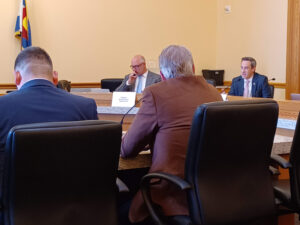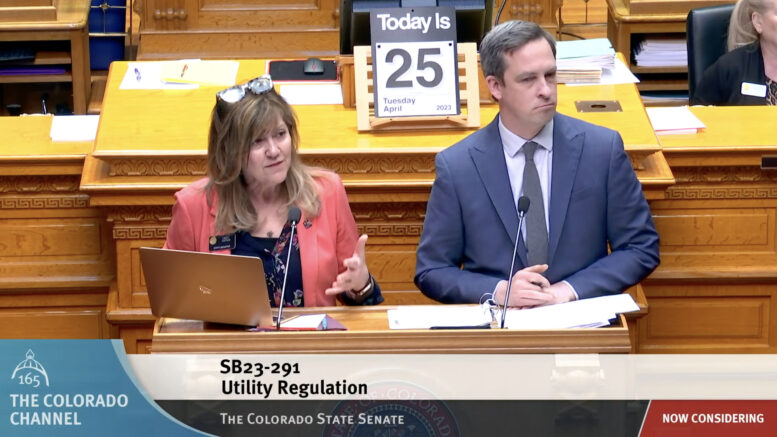Colorado senators on Wednesday approved a bill to increase regulation around utility spending that received a handful of changes that power providers called helpful but are not enough to end concerns that a bill meant to limit rate hikes might have the opposite effect.
Senate Bill 291, sponsored by Democratic Senate President Steve Fenberg of Boulder and Democratic Sen. Lisa Cutter of Morrison, came out of three hearings by the Joint Select Committee on Rising Utility Rates, formed after some natural-gas bills rose 75% this winter. It passed by a margin of 21-13, with Democratic Sen. Dylan Roberts of Avon joining of the chamber’s Republicans in voting against it, and heads now to the House.
The bill takes several steps that Fenberg told the Senate Finance Committee will limit future increases in rates by investor-owned utilities like Xcel Energy and Black Hills Energy by limiting them from recovering certain costs from customers and by increasing rate-making transparency. It also takes several steps to try to limit utilities’ long-term investment in natural-gas infrastructure as state leaders push to produce more renewable energy — a flashpoint in the debate over the impacts that SB 291 may have on rates.
Addressing effects on utility rates
Among its most significant provisions is one that would ban utilities from providing line-extension allowances, which are financial incentives to developments to help them extend gas service to new properties. The bill also would require the Public Utilities Commission to study whether the cost of gas-line extension to new developments disproportionately burdens other ratepayers and would mandate that utilities set a maximum per-month cost of fuel that they can pass along to customers rather than pass along 100% of cost spikes, as they do now.
Utility leaders told the finance committee during a Thursday hearing that such forced cost-sharing would increase their financial risks, which in turn could lower their bond ratings and force them to borrow money for infrastructure projects at higher costs. Fenberg questioned that assertion repeatedly, noting that utilities get state-approved monopolies to provide power over a designated area and therefore carry guaranteed returns that few other businesses offer.
Still, the Senate president added an amendment during debate in his chamber Tuesday that is meant to address the possibility of credit downgrades. It requires the PUC allow full recovery of fuel costs but allows the commission to mandate they be spaced out over a period not to exceed five years, and it also allows the PUC to take potential credit ratings into effect when determining in a ratemaking hearing the amount of costs that Xcel and Black Hills can recover.
“It begins to constitute a process of balancing the rights between the consumer and the utility,” Fenberg said of the bill. “This makes sure (utilities) have skin in the game on these fuel costs. And this doesn’t dictate how it happens.”
Opponents: Changes not enough
Utilities officials said even after the addition of the amendments, which state explicitly that utilities can include cost-saving strategies in their fuel-cost-sharing plans such as increasing natural-gas storage and employing more hedging contracts, that the bill is better. But they also said that setting a maximum monthly cost increase could wallop utilities during unusual cost spikes like severe winter storms and war-caused reductions in the gas supply, and that still could hurt credit ratings and force rate increases or cutbacks in infrastructure improvements.

Xcel Energy Colorado President Robert Kenney testifies to the Senate Finance Committee about Senate Bill 291 on April 20.
“We certainly understand the concerns about high utility bills … but a lot of it is out of our controls,” said Rachel Beck, executive director of the Colorado Competitive Council. “This creates a hostile regulatory environment.”
The bill, both proponents and opponents said, favors the electrification of new development over the use of natural gas in a significant way.
With the study on disproportionate costs and ban on gas-line extension incentives, SB 291 will raise the cost of new housing even as other bills are seeking ways to make homes more affordable, noted Dave Davia, CEO of the Rocky Mountain Mechanical Contractors Association. Sara Blackhurst, president/CEO of Southern Colorado advocacy group Action 22, called it a “thinly veiled move to get rid of one specific energy source” and said transmission lines in many rural areas of the state like hers aren’t prepared yet to handle a massive shift to electricity.
Electrification debate
“This bill favors one group of customers — those who choose to or can afford to transition to all-electric homes – over those who cannot,” Xcel Energy Colorado President Robert Kenney told the finance committee. “It does feel like this is more of an electrification bill than an affordability bill.”
Fenberg has said often, however, that he believes utilities can limit rate hikes if they stop spending so much to improve and expand natural-gas infrastructure and look at power-delivery alternatives that don’t depend so much on a fuel source with such volatile pricing. Danny Katz, executive director of the Colorado Public Interest Research Group (CoPIRG), added that with 68% of Colorado homes using natural gas for heating, utilities need to take steps to move away from that costly fuel source, even if state actions must spur the shift.
“Climate science demands that we get off fossil fuels in less than 30 years,” argued Alana Miller, Colorado director of climate and clean energy for the Natural Resources Defense Council. “We are currently incentivizing the cost of fossil fuels.”
Other consequences
SB 291 also disallows utilities from recovering from customers the costs of some costs, including advertising and lobbying expenditures. And it allows the PUC, if it chooses, to limit their ability to recover costs for attorneys and consultants who help to determine the rate hikes that the utilities seek before the commission.

Senate President Steve Fenberg (background) questions labor lobbyist Phil Hayes (foreground) about his concerns with Senate Bill 291 during an April 20 Senate Finance Committee hearing.
In addition to utilities and business groups, some labor groups — including Pipefitters Local 208 and Plumbers Local 3 — opposed SB 291 as introduced, saying its push to curtail gas-pipeline extensions could jeopardize the jobs of some 700 workers at Xcel alone in that area.
In response, Fenberg added an amendment clarifying that a study the PUC must do on the costs of natural-gas pipeline infrastructure also must evaluate the workforce impact of a move away from gas service.
